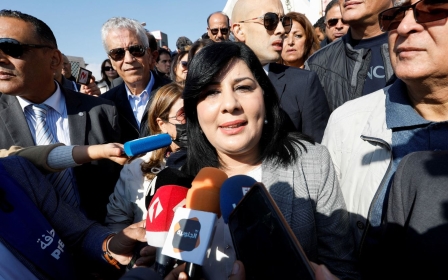Tunisia: Authorities extend jail term for opposition leader Rached Ghannouchi

Tunisian prosecutors extended a prison sentence handed down to opposition leader Rached Ghannouchi late on Monday, drawing fierce condemnation from his family and campaign team.
The Court of Appeal in Tunis extended the Ennahda party chief's one-year prison sentence over charges of "inciting hatred" to 15 months, following his appeal hearing.
Ghannouchi, 82, was sentenced to a year in prison in May, in a high-profile escalation of what activists and diplomats have described as a sweeping authoritarian crackdown by President Kais Saied.
Ghannouchi was not in court for the sentencing late on Monday, in line with his boycott of courts and legal proceedings which his lawyers have repeatedly denounced as unfounded and politically motivated.
His family and campaign team condemned the verdict late on Tuesday, telling Middle East Eye that "the charge was invalid and lacking any legal basis".
Stay informed with MEE's newsletters
Sign up to get the latest alerts, insights and analysis, starting with Turkey Unpacked
The case against him was initially filed by a police union after Ghannouchi reportedly called police officers "tyrants" in a eulogy he delivered at an Ennahda party member's funeral in February 2021.
"Mr Ghannouchi's long intellectual and political career, spanning several decades, clearly shows that he has been among the most prominent voices condemning takfeer [branding others as apostates] and extremism throughout all his writings and speeches," the "Free Ghannouchi" online campaign said in a statement.
"It is preposterous for him to be accused and convicted of "takfeer," and for the prison sentence to be confirmed by the Court of Appeal."
Saied, a former constitutional law professor, was democratically elected Tunisia’s president in 2019. A fiery populist, he billed himself as an outsider who could take on Tunisia's established political parties, which oversaw growth in democracy but also mounting economic challenges in the country of 12 million.
In 2021, however, he shuttered parliament and replaced it with a rubber-stamp assembly, an act that was revealed by MEE two months earlier.
He later rewrote the constitution to consolidate power and has targeted political opponents. Meanwhile, his vow to fix the country’s ailing economy has fallen flat, as Tunisians cope with high inflation and shortages of basic goods.
In recent months, the president has dismissed several ministers, including Prime Minister Najla Bouden, without explanation.
Saied immediately replaced her with Ahmed Hachani, a retired central bank employee who had shared articles on his Facebook account espousing conspiracy theories.
Since February, about 20 opposition, media, and business figures have been imprisoned, accused of "plotting against state security".
Among the other prominent opposition figures to be detained are former UK resident Said Ferjani, former justice minister Noureddine Bhiri and former public prosecutor Bechir Akremi.
Amnesty International has labelled the arrest campaign a "politically motivated witch hunt".
Middle East Eye delivers independent and unrivalled coverage and analysis of the Middle East, North Africa and beyond. To learn more about republishing this content and the associated fees, please fill out this form. More about MEE can be found here.





